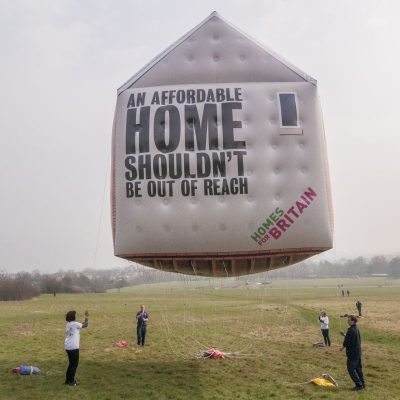The UK Has a Housing Crisis – and We Need Actions, Not Words to Solve It

The UK has a housing crisis. According to the National Housing Federation, 8.4 million people in England alone are living in sub-standard housing and 400,000 people are either homeless or at risk of being homeless. For one of the largest economies in the world, this is a shameful statistic. And yet the housing crisis is not given the due attention it requires, neither by politicians, nor the media. Even during the build-up to the December election, the issue was overshadowed by Brexit and although we may be familiar with the pre-election campaign soundbites promising more ‘schools and hospitals’, housing never becomes a key issue.
Yet housing constitutes one of our most basic, primal needs. So why is the UK in such a predicament? This is currently being debated. Many believe at the root of the failure is a lack of house building by the government. As Labour have pointed out, affordable housing was one of the first and biggest cuts the Conservative government made after coming to power in 2010. Official figures show that in 2018 the number of Government-funded affordable homes built for social rent fell by 90%, to fewer than 1,000, while Government figures suggest fewer than 3,000 council homes were built.
However a report published last year by the Tony Blair Institute concluded that a lack of house building was not the cause, and that construction was not the solution. According to Ian Mulheim, the report’s author, shortage of supply was a ‘red herring’ in the housing debate, with the real culprit being ‘low global interest rates that have made it easy for home owners and investors to take on large amounts of mortgage debt and pay ever more for houses’. He added that a ‘shrinking social rented sector, cuts to housing benefit and slow wage growth among young people are making rented housing less affordable for many, even though private sector rents are stable.’ Slow wage growth here is key. For while UK house prices have risen 160% since 1996, wages have not. Back in the 80s, for example, when my parents bought their house, prices were much more in line with people’s salaries. Your salary could be £30,000 and your house roughly the same amount.
However the sheer lack of houses cannot be ignored, and still plays a role. Problems began in 1979 with Margaret Thatcher’s ‘right to buy’ scheme. This allowed council house tenants to purchase the properties in which they were living, and it proved extremely popular. But it subsequently created a shortage of council houses which has not been addressed since. Back in 1979, for instance, around 42% of Brits lived in council housing; in 2008 the figure was closer to 12%. As The Guardian journalist John Harris has written, the ‘right to buy’ scheme ‘led to fractured communities, the rise of exploitative landlordism and a lack of housing so severe that some councils are now trying to buy their old homes back’. He was writing over a decade ago; the situation has not improved since.
What is being built now are luxury, top-end houses that are out of reach for the majority. For many young people buying their own house is nothing more than a distant dream. The big obstacle is the deposit, as it can take years of saving to accumulate the amount needed for a house in many of Britain’s cities. The Bank of Mum and Dad has been increasingly relied on in recent years, and yet it shouldn’t have to be. Last year, the Office for National Statistics (ONS) revealed that over the last two decades, there has been a 46% increase in the number of young people aged between 20-34 still living at home with their parents. In cities such as London, this is a common phenomenon, and it all creates additional pressure on families and society as a whole.
This is why house building is so important. Britain is not alone in its predicament and needs to follow the lead of other countries. Japan for instance built far more properties than England between 2013 and 2017 – 728,000 to be precise, reducing the number of rough sleepers by 80%. Switzerland gives local governments incentives to encourage housing development, partly why there is almost twice as much per person as there is in the United States. Here, however, the obstacle seems to be firstly, acknowledgement of the housing crisis and secondly, a lack of will to overcome it.
It is extraordinary that major publications such as The Economist publish articles which suggest it is ‘The West’s obsession with home ownership’ what is causing the problem. To put the problem back to the people, to imply that it is the desire to have your own home which is the problem, is a deeply flawed approach. It is convenient for the government, as this stance avoids it taking the blame. But the reality is that the housing market has spiralled out of control, and people’s salaries can’t catch up. The answer is to build more affordable housing, and more council housing now. It has to be made a priority.

